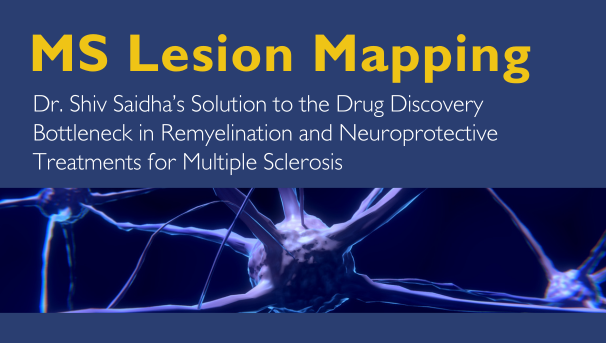Gifts of all sizes are incredibly important to advancing this project!
Please click the "Updates" tab to read Mary's story and why this project is so important to her!
Multiple sclerosis (MS) is a complex neurological condition characterized by the damage or loss of both the protective covering (myelin sheath) around nerve fibers and nerve cells (neurons) in the brain, spinal cord and optic nerve. In MS, the immune system mistakenly attacks the myelin sheath, triggering inflammation which leads to demyelination. This disrupts the normal flow of necessary electrical impulses along the nerves, resulting in a wide variety of symptoms ranging from difficulty with coordination, vision problems, bladder and bowel issues, fatigue, and pain among many other troubling and often debilitating symptoms. The demyelination process can create scar tissue which further contributes to the disruption of nerve signals. Over time, repeated – or ongoing – episodes of inflammation and demyelination result in neurodegeneration, the gradual loss of neurons and their connections. This continued, repetitive damage often leads to more severe and permanent neurological deficits. The exact cause of MS is not fully understood, but it likely involves a combination of environmental and genetic factors. Despite being discovered in the 1800s, there is still no cure for MS.
Existing MS treatments aim to manage symptoms, reduce inflammation, and slow down the progression of the disease; however, MS is a formidable opponent and we must strive for more. Many experts believe that remyelination is the key to the future of MS therapeutics. How do we get there? The greatest hindrance to the development of remyelinating therapies is our inability to reliably, specifically, and objectively measure and track demyelination and neurodegeneration, and therefore remyelination and neuroprotection. There are more than 20 drugs that have yielded promising results in animal models of MS, but very few have moved into human studies because there is not yet a dependable way to quantify the drugs’ effects on remyelination or neuroprotection. Until we identify a set of standards to measure and track these important aspects of MS, the field will continue to have a bottleneck of promising therapeutics that are unable to be tested for effectiveness and safety in human clinical trials.
Our Big Idea
A multi-disciplinary team led by Shiv Saidha, MBBCh, MD, MRCPI, of the Johns Hopkins Multiple Sclerosis Center, aspires to solve this problem. Dr. Saidha believes that understanding what is happening both within active and chronic/inactive MS lesions holds the key to “unlocking” the stable of potential remyelination and neuroprotective drugs to be investigated fully. One way to do this is by using novel magnetic resonance imaging (MRI) techniques to assess and quantify specific targets such as myelin, axons, and microglia. When healthy, axons are protected by a layer of myelin, and it is hypothesized that microglia – the immune cells of the central nervous system – may contribute to neurodegeneration in MS.
He and his team will determine the interplay over time between inflammation, demyelination, neurodegeneration, and therefore remyelination and neuroprotection, in active and inactive MS lesions, as well as the brain in general. This information is the missing link and must be known and understood in order to maximize the opportunity for clinical trials of neuroprotection and remyelination drugs to be successful in MS. Ultimately, the goal of the project is to identify and validate novel and highly sensitive MRI markers of remyelination and neuroprotection that are desperately needed to prove that newly and yet-to-be-discovered remyelination and neuroprotective compounds can be brought forward for evaluation in humans.
We need your help!
Philanthropy ignites the spark of discovery and accelerates its pace. Increasingly, the generosity of individuals serves as seed funding to get promising ideas and initiatives off the ground, so that “proof of concept” data can be secured. This critical information affirms that the investigation is on the right path and indicates a vote of confidence to large funding entities like the government and industry, increasing the likelihood of grant support. Dr. Saidha estimates that the study will require 70 participants over 3 years in order to provide the necessary data and be representative of the population of interest. The study will use 3-Tesla MRI, which generates high resolution images and is widely available outside academic medicine centers. 3-Tesla MRI is a perfect balance of specificity and accessibility for this groundbreaking lesion mapping study. Our goal is to raise $1,000,000 in order to launch this project before the end of 2024. On behalf of the nearly 2.8 million people living with MS across the globe and their families, we humbly ask you to consider contributing to this groundbreaking research and introducing us to others who might also support it. We remain determined to find a cure for MS and cannot do it without generous people like you.
We invite you to make your gift securely through this online portal, or contact Gina Scalise, Sr. Associate Director of Development, for assistance with other philanthropic modes (donor advised fund, gift of securities, etc...) or to learn more. Gina can be reached via email at gscalis1@jhmi.edu or phone at (443) 287-7872. Thank you for your consideration!



